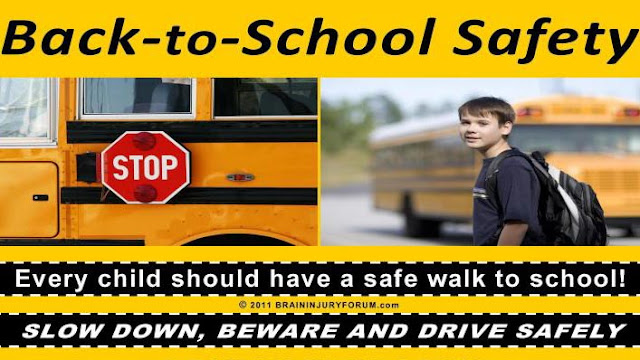Back To School Safety
Back to School Safety
It’s that time of year again: Kids walking to and from school, school buses
making their routes, parents and guardians dropping off and picking up kids…
Every year we prepare for safety but sometimes accidents and incidents will still
occur. Here are a few tips for parents
and youths to stay safe.
For Parents and Other Adults: If you’re dropping of a youth, remember: More kids are hit by schools more than any
other location according to the National Safe Routes to School Program. Schools often have very specific drop-off procedures for the school year.
Make sure you know them for the safety of all kids.
·
Don't double park; it blocks visibility for other children and vehicles
·
Don't load or unload children across the street from the school
·
Be watchful around
schools and bus stops for children running into the street.
·
Watch for children
entering the street from behind buses or running to catch the bus.
·
When driving your
children to school, deliver and pick them up as close to the school as
possible. Don't leave until they are safely on school grounds.
·
Drive slowly when
approaching children riding bicycles and walking near the street.
·
Watch your speed when
entering school zones.
·
Never pass a bus from behind – or from either direction if you're on an
undivided road – if it is stopped to load or unload children
·
If the yellow or red lights are flashing and the stop arm is extended,
traffic must stop
·
The area 10 feet around a school bus is the most dangerous for children;
stop far enough back to allow them space to safely enter and exit the bus
·
Be alert; children often are unpredictable, and they tend to ignore hazards
and take risks
·
When passing a bicyclist, proceed in the same direction slowly, and leave 3
feet between your car and the cyclist
·
When turning left and a bicyclist is approaching in the opposite direction,
wait for the rider to pass
·
If you're turning right and a bicyclists is approaching from behind on the
right, let the rider go through the intersection first, and always use your
turn signals
·
Watch for bike riders turning in front of you without looking or signaling;
children especially have a tendency to do this
·
Watch for bikes coming from driveways or behind parked cars
·
Check side mirrors before opening your door
When walking:
·
Pay special attention
to all traffic signals and crossing guards.
·
Never cross the street
against a red light, even if you don't see any traffic coming.
·
Wear reflective
clothing and bright colors so drivers can see you easier.
·
Plan a safe walking route
to school or the bus stop. Choose the most direct way with the fewest street
crossings and if possible, with intersections that have traffic controls.
·
If in a new
neighborhood or first time walking to school, walk with your child the route to
take, paying attention to “markers” that will remind the child they are on the
right route (i.e. a lawn decoration or color of a house) and to avoid crossing
empty lots, construction areas, and parks where there aren't many
people. Encourage kids to walk to school or the bus stop with a sibling or
friend, and wait at bus stops with other children.
·
Advise children to
arrive early for buses, stay out of the street, and to wait for the bus to come
to a complete stop before approaching the street.
·
Keep your phone down!
Watch where you’re walking and pay attention to traffic!
Riding a bike:
·
Wear light or bright
color clothes when riding.
·
Always wear your
helmet when you're riding.
·
Ride with a friend or
your parents.
·
Have a headlight and
reflectors on your bike.
·
Learn and obey the
traffic rules.
Traveling
by School Bus:
- Never step off the curb until the bus comes to a complete stop.
- Always use the seat belt if the bus if equipped with them.
- Do not move around in the bus. Stay sitting in your seat.
- When leaving the school bus stay in view of the driver and always cross the street in front of the bus.
- Even though traffic should stop for a school bus, always check both ways before crossing the street.
Know your safety rules!
Parents: Always keep up-to-date information about your
child (height, weight) and recent pictures.
Any route you take and any neighborhood you live in,
make sure you use the Nevada Sex Offender Registry to know of registered
offenders in your area.
Nevada Sex Offender Registry
Search Website:
After signing up, members then have the ability to receive law enforcement emergency alerts, crime and sex offender alerts, prevention tips, and much more. It also includes a virtual neighborhood watch where members can share photos and information regarding suspicious activity with neighbors, police, and even Homeland Security.
Talk to your children about their day. Ask your children if they see anyone bullied, if they are bullied, or if anything else makes them feel uncomfortable. Look for warning signs of bullying, such as a sudden drop in grades, loss of friends, or torn clothing.
If you see something that is suspicious in your neighborhood, report it to local law enforcement and post information and updates to your neighbors on AlertID to help reduce crime.
Keep an eye on your children's Internet use! Talk to your children about what they do online - what sites they visit, who they email, and who they chat with. Encourage them to speak up if something makes them uncomfortable, or if they witness forms of cyberbullying, such as threats or harassment.

Comments
Post a Comment